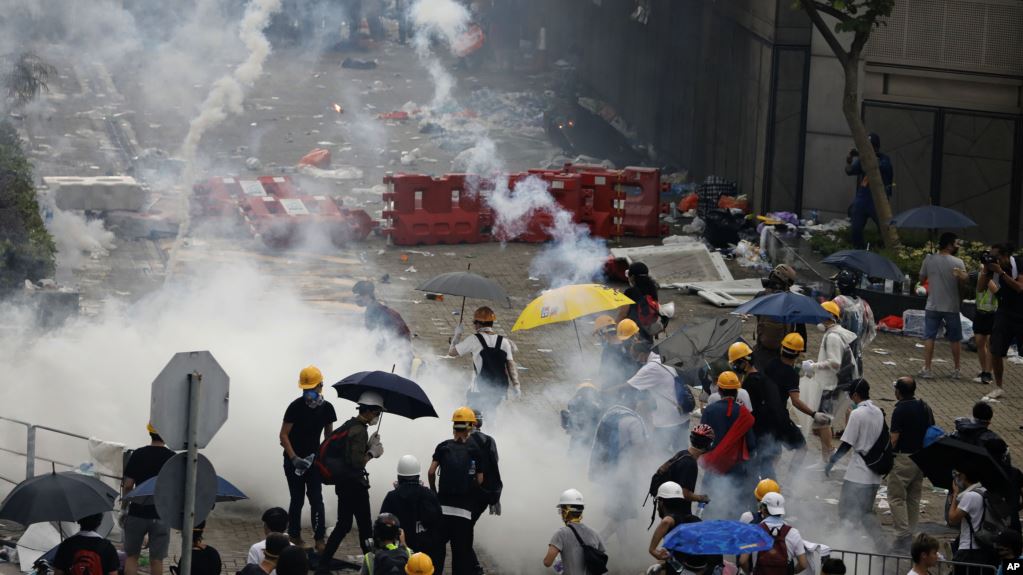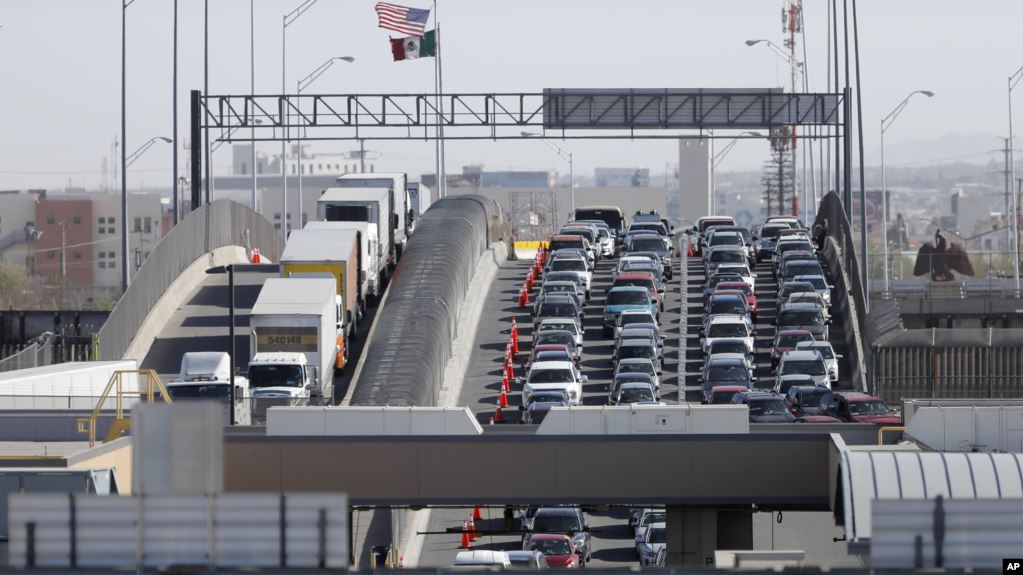뉴스&스피킹(영자신문)
하루 10분이면 영어에 대한 두려움을 극복하고 누구나 유창하게 영어를 구사하실 수 있습니다.
-
 Hong Kong Police Fire Tear Gas, Rubber Bullets at Protesters Hong Kong police on Wednesday fired tear gas and rubber bullets at protesters outside government headquarters. The crowd of mostly young people was protesting a proposed bill that would permit criminal suspects to be sent to mainland China for trial.
Hong Kong Police Fire Tear Gas, Rubber Bullets at Protesters Hong Kong police on Wednesday fired tear gas and rubber bullets at protesters outside government headquarters. The crowd of mostly young people was protesting a proposed bill that would permit criminal suspects to be sent to mainland China for trial.
The violence came after protesters forced the delay of a legislative debate over the bill. It has led to another major political crisis for the semi-autonomous city.
The crowd occupied major downtown streets, overturning barriers outside the government building. Protesters could be seen throwing rocks, bottles, umbrellas and other objects at police. The police answered by firing tear gas, pepper spray, rubber bullets and water at the protesters.
A Hong Kong police spokesman defended the decision to use tear gas and other non-deadly weapons. He said officers would not have done so if they were not facing their own danger -- including possible death.
Hong Kong Police Commissioner Stephen Lo Wai-chung described the demonstration as a riot. “There’s no need to hurt innocent people to express your opinions,” he said, adding that people should not “do anything they will regret for the rest of their lives.”
His words added to concerns that Hong Kong’s government is using public disturbance laws to intimidate political protesters.
The government said Wednesday morning’s legislative session would be “changed to a later time.” Some businesses closed for the day. Students boycotted classes. And unions called for labor strikes.
A protester who gave only his first name, Marco, told the Associated Press, “We want the government to just set the legislation aside and not bring it back.”
Another protester, who gave her name only as King, said, “We have to stand up for our rights or they will be taken away.”
Hong Kong currently limits extraditions only to authorities with which it has existing agreements. China has been excluded from such agreements because of concerns over its human rights record and judicial system.
Hong Kong Chief Executive Carrie Lam had said earlier that the extradition bill seeks to prevent Hong Kong from becoming a place for criminals to hide. Lam said the government has changed the bill in recent months to increase human rights protection. She said that she had not received any orders from China to push the bill forward.
Under its “one country, two systems” rule, Hong Kong was guaranteed the right to its own social, legal and political systems for 50 years following its handover from British rule in 1997.
However, some observers have said China’s ruling Communist Party ignores that agreement by forcing through unpopular legal changes.
On Wednesday, China’s Foreign Ministry repeated its support for the bill. A ministry spokesman denied China has been interfering in the city’s business in ways that violate the handover agreements. He said, “Hong Kong people’s rights and freedoms have been fully guaranteed in accordance with law.”
Chinese President Xi Jinping has said in the past that he would not permit Hong Kong to have greater self-rule or be used as a base to challenge the Communist Party’s rule.
I'm Jonathan Evans.View -
 US Confirms Traveler Photos Stolen in Cyberattack Internet hackers have stolen tens of thousands of pictures of travelers and vehicles collected at the United States border.
US Confirms Traveler Photos Stolen in Cyberattack Internet hackers have stolen tens of thousands of pictures of travelers and vehicles collected at the United States border.
U.S. Customs and Border Protection, or CBP, officials confirmed the attack on Monday. The agency said the photographs were stolen from the computer network of a contractor that captures the images for the government. Officials did not name the contractor.
A CBP spokesman told the Associated Press that the agency believes that the incident involved the photographs of fewer than 100,000 people. Images were taken of travelers in vehicles entering and leaving the United States at a single land border crossing over one-and-a-half months, the spokesman said. The images also included license plates of vehicles crossing the border.
The CBP said in a statement that it learned of the cyberattack on May 31. The agency said the government contractor violated CBP policies by copying the pictures to the company’s computer network. Officials said only the contracting company’s network was hit in the cyberattack. The CBP’s computer systems remained safe.
The CBP statement said none of the image information had so far been identified as appearing on the internet or the “dark web.” The dark web is a part of the internet that cannot be found through normal search engines. It uses digital tools to hide identifying information and is often used for criminal activity.
The CBP said it was working with other law enforcement agencies “to actively investigate” the attack. The agency said it had “removed from service” all equipment related to the incident and was closely watching all CBP work done by the contractor.
“CBP takes its privacy and cybersecurity responsibilities very seriously and demands all contractors to do the same,” the agency statement said.
U.S. Customs and Border Protection is part of the Department of Homeland Security (DHS). The DHS described its automated vehicle license readers in a 2017 privacy document. The document said the readers are used for identifying, catching “and removing individuals illegally entering the United States at and between ports of entry or otherwise violating U.S. law.”
The license plate information is checked against existing records shared among 13 federal agencies, the AP reported.
Representative Bennie Thompson of Mississippi serves as chairman of the U.S. House Committee on Homeland Security. Thompson noted that the incident was the “second major privacy breach at DHS this year.”
In March, the DHS’s inspector general announced the Federal Emergency Management Agency had wrongly released to a contractor the personal information of 2.3 million U.S. disaster survivors.
Thompson said in a statement that U.S. officials “must ensure we are not expanding the use of biometrics at the expense of the privacy of the American public.”
The British computer security website The Register said the hacker responsible informed the publication in late May of the attack. The Register identified the government contractor as the company Perceptics. The company has not yet publicly discussed the hacking incident.
The Tennessee-based company describes itself as the provider of license-plate readers for passenger vehicle inspection “at all land border ports of entry in the United States, Canada and at the most critical lanes in Mexico.”
Civil liberties groups have expressed concern at the general lack of rules covering license plate-reading cameras and image collection by government agencies and law enforcement. Critics say the technology carries the risk of abuses when the private information of citizens is widely shared among agencies or stolen in cyberattacks.
I’m Bryan Lynn.View -
 Reports: Iran Increases Production of Enriched Uranium Iran has increased production of low-enriched uranium at a time of tensions with the United States over Iran’s nuclear deal with western powers.
Reports: Iran Increases Production of Enriched Uranium Iran has increased production of low-enriched uranium at a time of tensions with the United States over Iran’s nuclear deal with western powers.
Two semi-official Iranian news agencies reported Monday that Iran now produces four times as much low-enriched uranium as before. Enriched uranium can be used to produce nuclear power. It also can be used to make nuclear weapons.
The news agency reports appeared just after U.S. President Donald Trump warned Iran it would face its “official end” if it ever threatened America again.
His warning comes after days of increased tensions between the two sides. The tensions were fueled by the Trump administration’s deployment of bombers and an aircraft carrier to the Persian Gulf. U.S. officials have defended the move, saying it was to answer threats from Iran.
Administration officials plan to inform U.S. lawmakers on Tuesday about the threat they say that Iran poses to the country and U.S. interests.
Earlier this month, officials of the United Arab Emirates claimed that four oil transport ships were sabotaged. Yemeni rebels allied with Iran used drone aircraft to launch an attack on an oil pipeline in Saudi Arabia. And U.S. diplomats said airline companies could be mistakenly attacked by Iran, an idea Iran has dismissed.
Timeline of Iran’s nuclear program
The tensions between Iran and the United States come one year after Trump decided the U.S. would withdraw from a nuclear deal between Iran and world powers.
Both the United States and Iran say they do not want war. Yet many observers worry any mistake by either side could lead to events out of their control.
Both the semi-official Fars and Tasnim news agencies reported on the increased production of enriched uranium. They said the information came from a spokesman for Iran’s nuclear agency. The official said Iran “in weeks” would reach the 300-kilogram limit set by the nuclear deal. He added that the government had informed the International Atomic Energy Agency about its move.
Trump’s comment came just hours after a Katyusha rocket fell in Baghdad’s Green Zone, about 1.5 kilometers from the U.S. Embassy. No injuries were reported.
An Iraqi military official told the Associated Press that the rocket was fired from East Baghdad. That area is home to many Iran-supported militias.
Trump wrote on Twitter, “If Iran wants to fight, that will be the official end of Iran. Never threaten the United States again!”
Iranian Foreign Minister Mohammad Javad Zarif tweeted that Trump was making “genocidal taunts. He ended his tweet with “Try respect – it works!”
Other developments
Trump ordered the U.S. withdrawal from the 2015 nuclear agreement with Iran and strengthened sanctions against Iran. The U.S. government also has warned of actions against other nations if they import Iranian oil.
Iran just announced it was backing away from the nuclear deal in which Iran agreed to limit its enrichment of uranium if sanctions were removed. Iran has given European countries 60 days to come up with a new deal or it will begin enriching uranium at a higher level.
Iran has always said it does not seek nuclear weapons. But Western nations have questioned this claim.
Appearing on Fox News television on Sunday, Trump called the 2015 nuclear deal a “horror show.”
“I just don’t want them to have nuclear weapons and they can’t be threatening us,” he said.
Yet the nuclear deal had prevented Iran from getting enough highly-enriched uranium for a bomb. United Nations inspectors repeatedly said that Iran was honoring the deal.
On Sunday, the U.S. Navy announced it would begin security patrols in international waters along with members of the Gulf Cooperation Council. The council includes many Gulf States.View -
 Study: Dogs Can Feel Their Owners' Stress, Too When dog owners experience a long period of stress, they are not alone in feeling the pressure. Their dogs feel it, too.
Study: Dogs Can Feel Their Owners' Stress, Too When dog owners experience a long period of stress, they are not alone in feeling the pressure. Their dogs feel it, too.
That information comes from new a study published Thursday in Scientific Reports.
Swedish scientists centered the research on 58 people who own border collies or Shetland sheepdogs. Both are traditionally herding dogs.
The scientists examined hair from the dog owners and their dogs. They looked at the levels of a hormone called cortisol. This chemical is released into the bloodstream during stressful experiences. Pieces of hair can take in this chemical.
Depression, extreme physical exercise and unemployment are just a few examples of stress causers that can affect the amount of cortisol released in humans, said Lina Roth of Sweden’s Linkoping University.
Roth and her team found that cortisol levels in the hair of dog owners closely matched levels found in their dogs. The researchers say this suggests their stress levels were in sync -- or connected.
Roth believes that the owners are influencing the dogs instead of dogs influencing their human owners. That is because there are human personality traits that also appear to affect dogs’ cortisol levels.
But, why is it that people influence their dogs and not the other way around? It could be, Roth said in an email, because people are “a more central part of the dog’s life, whereas we humans also have other social networks.”
The study results are no surprise, said Alicia Buttner. She is director of animal behavior with the Nebraska Humane Society in the American city of Omaha.
Buttner said new evidence is continually found to show people and their dogs have extremely “close bonds that resemble the ones that parents share with their children.”
Buttner also said there is not enough evidence to prove that the influence goes only one way.
She said, “It’s not just as simple as owner gets stressed, dog gets stressed.”
Buttner said cortisol levels do not necessarily demonstrate “bad” stress. They instead can be representative of a good experience like getting ready to go for a walk, she said.
Roth and her team plan to investigate whether other kinds of dogs react to their owners the same way.
For now, she offers advice for reducing how much stress a dog owner may be causing their pet. Dogs that play more show fewer signs of stress, she said.
So “just be with your dog and have fun,” Roth said.
I'm Ashley Thompson.View -
 China Blamed for Cyberattack on Messaging Service Telegram A messaging service said that it was hit by a powerful cyberattack from China as a huge protest took place in Hong Kong.
China Blamed for Cyberattack on Messaging Service Telegram A messaging service said that it was hit by a powerful cyberattack from China as a huge protest took place in Hong Kong.
The attack on the application called Telegram slowed messages, but did not take or destroy user information. It happened as thousands of protestors surrounded Hong Kong government headquarters on Wednesday. They were protesting legislation that would permit people from Hong Kong to be sent to mainland China to stand trial. Police used tear gas and rubber bullets to break up the demonstration. As a result, The Hong Kong government delayed the debate over the bill.
On Thursday, Telegram chief Pavel Durov tweeted that most of the attackers had IP addresses from China.
“Historically, all state actor-sized (attacks) we experienced coincided in time with protests in Hong Kong,” Durov said.
Activists in both Hong Kong and mainland China often use Telegram to organize protests. They believe its special security measures will permit them to escape government surveillance of Chinese social media apps, such as WeChat. WeChat users reported this week that photos of the protests could not be seen.
Apps like Telegram offer more privacy and independence. Telegram is blocked in mainland China, but users can use it with special software. Websites like Facebook and The New York Times also are blocked.
Telegram says that messages sent on its system cannot be unlocked by third parties. “We can ensure that no single government… can intrude on people’s privacy and freedom of expression,” Telegram says on its website.
Telegram said that the latest attack was the result of many millions of false requests “which stop (the servers) from processing legitimate requests.”
The company said later Wednesday that its system had returned to normal.
The protest in Hong Kong forced the legislature to close Wednesday and Thursday, delaying debate on the bill.
Those against the legislation say it would hurt freedom and destroy Hong Kong’s legal independence. Hong Kong’s Chief Executive, Carrie Lam, said the legislation is necessary. She added that it would ensure that human rights are protected.
Hong Kong is a semi-independent Chinese territory. It enjoys greater freedoms than mainland China because of a “one country, two systems” agreement. A former British colony, Britain returned Hong Kong to China in 1997 after the agreement was reached.
People who live in Hong Kong can freely use the Internet and take part in public protests.
The U.S. government has blamed Chinese computer experts for illegally taking information and trade secrets. Officials are negotiating some of these issues in the current trade talks between the U.S. and China. Also, defense department officials told a congressional committee this month that China is becoming better at cyberattacks.
Chinese foreign ministry spokesman Geng Shuang was asked about Thursday’s attack on Telegram during a news conference. Geng said he did not know about the case but that “China always opposes any form of cyberattack.”
“China is also a victim of cyberattacks,” Geng said.
I’m Susan Shand.View

